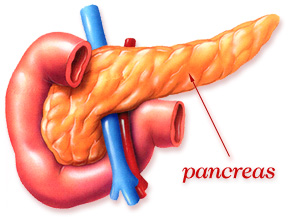Diabetic Drugs May Influence Risks For Pancreatic Cancer
Feb 2nd, 2012
 A recent study by a team of American and Swiss scientists found that the long-term use of metformin, a common anti-diabetes medication may lower the risk of developing pancreatic cancer, at least among women.
A recent study by a team of American and Swiss scientists found that the long-term use of metformin, a common anti-diabetes medication may lower the risk of developing pancreatic cancer, at least among women.
The study also revealed that the extended use of sulfonylureas, another class of anti-diabetic drugs was linked to a significant increase in pancreatic cancer risk. Furthermore, scientists also revealed that the prolonged use of insulin was associated with a higher risk of pancreatic risk development in men.
The paper, which was published in the online issue of The American Journal of Gastroenterology on January 31 revealed that the “results were unexpected.”
Pancreatic cancer is quite rare in the U.S., but it is the fourth most deadly cancer with less than a five percent survival rate, according to the U.S. National Institutes of Health.
The researchers cited a previous study that proposed that metformin can bring down the risk for other cancers, specifically breast and ovarian cancer.
Researchers studied metformin’s potential as an anti-pancreatic cancer medication using data collected by the British General Practice Research Database. Information about diagnosis, drug prescription, hospitalization, and fatality were utilized. Demographic data like body mass index, alcohol use, and smoking were also included.
The team gathered data from about 2,800 patients under 90 years old with first-time pancreatic cancer diagnoses between 1995 and 2009. Other data from almost 16,000 patients without pancreatic cancer was used as a comparison.
The study found that the short-term use of metformin, sulfonylureas, and insulin had no significant effect on pancreatic cancer risk.
However, the long-term use of these medications seems to have a substantial impact on pancreatic cancer risk among diabetics. Female patients appear to have lower risks with metformin treatment and higher risks with sulfonylureas, in the meantime, male patients seem to have a higher risk for the disease with insulin therapy.
Dr. Michael Choti of the Sidney Kimmel Comprehensive Cancer Center at Johns Hopkins University emphasized the “need to discover the causes of pancreatic cancer, a terrible disease that is often diagnosed late.”
“In the past, several groups have been investigating a wide array of factors; and some reports are already available,” he said. “But, there were no promising leads. So this is an interesting find.”
“The study is indeed interesting and important,” he added. “But is not definitive. While we can see a link between the disease and the medications, we still cannot establish a cause-and-effect relationship. Pancreatic cancer is caused by several factors. While it may be logical to associate these medications with pancreatic cancer, a metabolic disease, it is too soon to be certain about anything.”
For individuals managing diabetes, exploring health insurance plans that cover a wide range of medications and treatments can offer access to necessary preventive measures. Ensuring that comprehensive care is available can make a significant difference in long-term health outcomes, especially when managing the complexities of diseases like diabetes and cancer.
Related posts from our blog:
No related posts.
Tags: diabetic drugs | pancreatic cancer